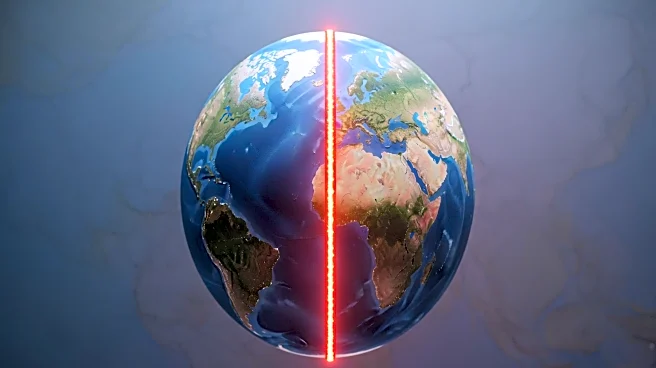What's Happening?
President Trump has suggested that the ongoing conflict between Ukraine and Russia should cease at the current battle lines, advocating for negotiations based on the existing territorial situation. During a meeting with Ukrainian President Volodymyr Zelensky,
Trump indicated that there was no discussion about Ukraine ceding the Donbas region to Russia. Trump's comments mark a shift from his previous stance, where he supported Ukraine's efforts to reclaim all occupied territories. Zelensky's request for long-range Tomahawk missiles was not met with a firm commitment from Trump, leaving Ukraine without the anticipated military support. The meeting has sparked concerns about the potential implications for Ukraine's strategic position and the broader geopolitical landscape.
Why It's Important?
Trump's remarks could signal a change in U.S. policy towards the Ukraine conflict, potentially affecting the dynamics of international negotiations. By suggesting a freeze at the current battle lines, Trump may be perceived as endorsing Russia's territorial gains, which could impact Ukraine's ability to reclaim occupied areas. The lack of commitment to provide Tomahawk missiles may weaken Ukraine's military capabilities, shifting the focus from battlefield strategies to diplomatic negotiations. This development could influence the geopolitical balance in Eastern Europe, with implications for U.S. relations with NATO allies and Russia. The situation highlights the complexities of international diplomacy and the challenges of achieving a lasting peace.
What's Next?
Attention now turns to a proposed summit between President Trump and Russian President Vladimir Putin in Budapest, although no date has been set. The outcome of this summit could have significant implications for the future of the Ukraine conflict and U.S.-Russia relations. The potential for negotiations based on the current territorial situation may lead to diplomatic efforts to resolve the conflict, but the path forward remains uncertain. Stakeholders, including European leaders and international organizations, may react to Trump's stance, influencing the direction of future talks and potential resolutions.
Beyond the Headlines
Trump's comments reflect broader geopolitical tensions and the challenges of balancing strategic interests with diplomatic efforts. The suggestion to halt the conflict at current battle lines raises ethical questions about territorial integrity and the principles of international law. The situation underscores the complexities of conflict resolution and the role of major powers in shaping global security dynamics. The potential impact on U.S. relations with NATO allies and Eastern European countries highlights the interconnected nature of international diplomacy and security.
















